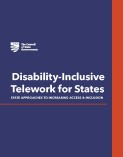Highlighting Effective Policies & Practices
Laying the Groundwork
Advancing Inclusion and Diversity in the Workforce
This report from USCM’s Workforce Development Council features best practices and programs from cities across the country that have proven successful in increasing employment outcomes of people with disabilities.
Disability-Inclusive Telework for States: State Approaches to Increasing Access & Inclusion
This issue brief offers guidance to state policymakers on developing and implementing more inclusive telework policies and programs for state agencies. The brief also includes an overview of workplace protections under the Americans with Disabilities Act and summarizes the fiscal impacts of inclusive telework.
The Future of the Workforce: Approaches to Increasing Access & Inclusion
CSG’s report highlights preliminary findings of state strategies and policy options to increase access and inclusion for people with disabilities among three emerging topic areas: advances in automation and technology; the rise of the gig economy; and the changing nature of apprenticeship.
Kentucky Work Matters Task Force Recommendations
This report looks at issues and options specific to the state of Kentucky, but with potential for replication or adaptation by other states. CSG's Kentucky Work Matters Task Force Lessons Learned highlights best practices gleaned from the Task Force's process and results.
States Expand Employment and Training Opportunities for People with Disabilities
NGA's issue brief outlines opportunities for governors to help people with disabilities overcome barriers to employment and successfully enter and remain in the workforce.
Preparing for Work
Learning on the Job for People with Disabilities
NCSL’s LegisBrief describes promising policies and programs to help expand work-based learning opportunities for individuals with disabilities.
A Path to Employment for Veterans with Disabilities
NCSL's report details 12 policy options states can adopt to facilitate the transition of veterans into the civilian workforce.
Getting to & Accessing Work
Crafting Inclusive Autonomous Vehicle Policies
NCSL’s LegisBrief provides examples of actions states can take to ensure autonomous vehicle technology is accessible to people with disabilities.
Staying at Work
Stay At Work-Return To Work for Employees with Mental Health and Substance Use Issues -Companion Toolkit
This toolkit is a companion piece to WIG’s “Mental Health and Substance Use Disorders Toolkit” (2017) and focuses on state initiatives and best practices to improve employment outcomes for those with mental health and/or substance use disorders.
Stay-at-Work/Return-to-Work Toolkit
Stay-at-work/return-to-work (SAW/RTW) was identified as a critical priority area in Work Matters. This supplemental resource provides states with policy options, best practices and implementation strategies to increase the retention of employees who become ill or injured while in the workforce.
Workers' Compensation: Keeping Injured and Ill Workers in the Workforce
NCSL's report explores how states can utilize workers' compensation programs and benefits to keep workers who are injured on the job engaged in the workforce during and after their recovery.
COVID-19
COVID-19 Federal Disability-Specific and Other Related Guidance
SEED’s policy brief summarizes guidance issued by Federal Government agencies that can assist states and localities in ensuring their policies align with America’s civil rights laws and other disability-related policies.
SEED COVID-19 Policy Collaborative: Frameworks for a Disability-Inclusive Recovery
This guide highlights important topics identified by the SEED COVID-19 Policy Collaborative to ensure a disability-inclusive recovery and provides a series of coinciding policy frameworks to assist state and local policymakers in their efforts to adopt disability-inclusive COVID-19 recovery initiatives.
SEED COVID-19 Policy Collaborative for an Inclusive Recovery Convenings Report
This report provides a summary of the SEED COVID-19 Policy Collaborative convenings hosted from February-May 2023. It includes meeting highlights; key themes and priority issues; an overview of the breakout group discussions; and an appendix with a list of participants, agendas and resources shared during the convenings.
SEED COVID-19 Policy Collaborative: Policy Checklist for a Disability-Inclusive Recovery
This checklist is designed to assist state and local policymakers in their efforts to adopt disability-inclusive COVID-19 recovery policies and initiatives. It features policy options gathered from the SEED COVID-19 Policy Collaborative, as well as research conducted into federal, state and local COVID-19 policy responses that are inclusive of people with disabilities.
Apprenticeships: A Pipeline for an Inclusive Recovery
This report examines state and federal actions aimed at enhancing disability inclusion in apprenticeships and explains why inclusive apprenticeships is an effective workforce development tool to aid economic recovery in the COVID-19 response.
COVID-19 Federal Disability-Specific and Other Related Guidance
CSG’s policy brief summarizes guidance issued by Federal Government agencies that can assist states and localities in ensuring their policies align with America’s civil rights laws and other disability-related policies.
Making Work Safe and Accessible During a Pandemic
This report reviews the rules and guidance issued by federal, state and local agencies that help keep workers, including those with disabilities, safe on the job.
The Pandemic’s Effect on the Economy and Workers
This report examines economic data and workforce trends following the emergence of COVID-19 in the U.S and its impact on employment opportunities for people with disabilities.
The Promise of Telework
NCSL’s report highlights examples of effective federal and state telework programs and provides recommendations on how states can ensure their telework policies and programs are inclusive of people with disabilities.




















